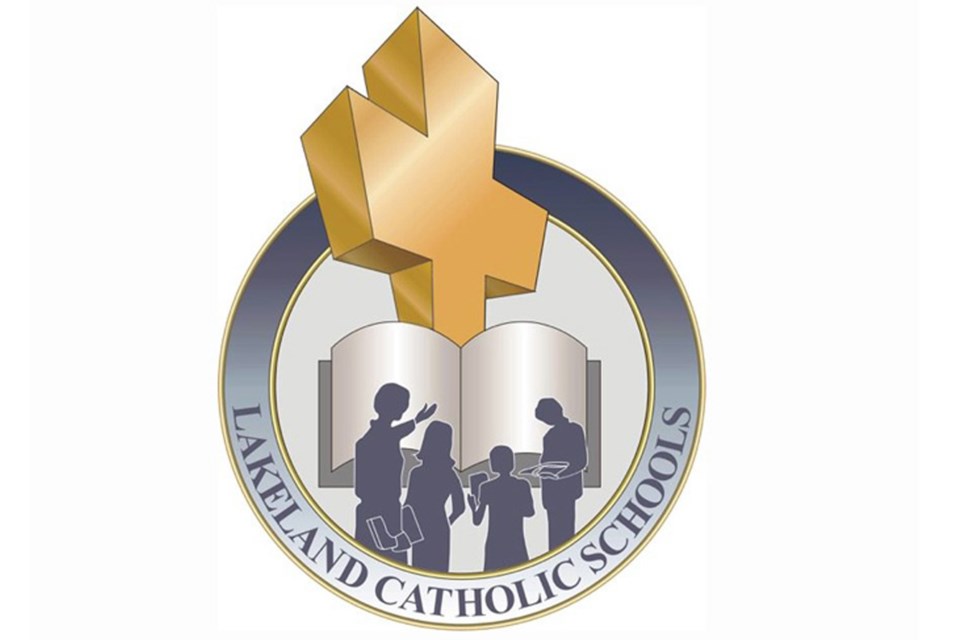LAKELAND – Inclusive Education at Lakeland Catholic School Division (LCSD) had to make some changes to how services are delivered since the COVID-19 pandemic began.
Director of Student Learning Michelle Dargis explained during the board of trustee’s March 17 meeting that the Lakeland Catholic Multi-disciplinary Team (LCMT) was created to "serve all students with specialized programming needs, both academically, socially, and emotionally."
The LCMT includes a speech-language therapist and two assistants, an occupational therapist, English Language Learner (ELL) support teacher, Indigenous outreach worker, and a registered psychologist.
Typically, students are referred to the LCMT and a baseline is determined for their skill level and deficits. Intervention is then offered either at the classroom level or in a one-on-one situation.
“In addition, the team spends a considerable amount of time consulting with teachers about strategies and supports. They work together to provide resources, such as visuals, books, and activities, to support the recommendations that they have put forward,” Dargis explained.
When the province first announced schools were to close to in-person learning due to rising COVID-19 cases, the LCMT had to get creative with how they were going to continue to support their students.
The speech-language team provided just over 100 online sessions to students using a Teletherapy platform, Dargis stated, and sessions were provided to students with severe or complex communications needs.
The ELL support teacher provided hands-on practice materials that parents could complete with their children at home.
“The packages were made and sent either via email or picked up at designated schools. The completion rate was extremely high on these packages in the spring,” noted Dargis.
When students headed back to classrooms in the fall of 2020, the LCMT was able to provide assessments and services in-person most of the time.
“To ensure the safety of our students and team, sanitization procedures, masking, physical distancing, and COVID-19 assessments (happen) every day,” Dargis said. “Group therapy sessions happen in existing classroom cohorts to minimize the exposure. In addition, the district has provided our team with the clear masks, which allows the students to see the mouths and the positions of the speech therapy assistant, speech therapist, and ELL teacher either in intervention or on in-take.”
According to Dargis, most of the LCMT services are being provided in-person and online speech-language services are being offered to students who are learning from home.
All ESL families received a call from the ELL support teaching in the fall when there was a spike in COVID-19 cases because the LCMT noticed a dip in their attendance.
“Families would have preferred to have their children present at school, however, the anxiety of the virus proved to be a bit stressful for the families and there were a plethora of reasons for what was the cause,” Dargis told the board. “But, they felt it was best to keep their children at home, temporarily, for health and employment concerns, to multi-generational cohabitation and some great concerns for their elders and family. Those were some reasons why they kept their children at home.”
This current school year has seen the speech-language team providing services to over 175 students. The occupational therapist has a caseload of 102 pupils, with nine students being discharged from this service because their skills are within normal limits.
Packages were created for students who the LCMT assists during the week of at-home learning in January.
There are 223 ELL students working with the ELL support teacher.
Between September 2020 and March 2021, there were 55 intakes conducted by the LCMT.
The Indigenous outreach worker began full-time in February and Dargis noted the "uptake has been notable." That month alone saw 20 referrals of either Métis or Indigenous status students.
The registered therapist started at the end of January of this year and has already consulted on five complex cases in LCSD schools and has 14 student referrals for one-on-one therapy.
Dargis stressed each member of the team has been able to help students during the pandemic, whether they were in class or at home.
“They have been very flexible during the COVID-19 pivots, whether it’s because the students were in isolation or the team members needed to isolate. We did have two cases where our members had to isolate.”
A focus for the LCMT will be providing universal strategies that will be modelled within classrooms, which will build staff capacity to support all students.



